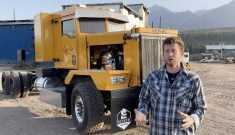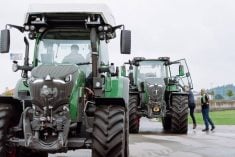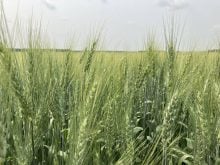BROOKDALE, Man. – With the backdrop of a bright, yellow canola field and a blue sky, Lindsay Coulthard had a message for his listeners that the Manitoba Zero Tillage Research Association is much more than zero tillage.
During the annual tour of its farm north of Brandon, Coulthard, farm manager, announced that the association is shifting gears and intends to focus more on sustainable farming practices. The association has altered its name to reflect that change.
“We’ve adopted a tag line – the leader in sustainable farming systems,” Coulthard said to a group of 60 producers, academics and media who participated in this year’s tour.
Read Also

Why feds imposed EV tariffs
Moe and Kinew have a fight on their hands when it comes to eliminating the EV tariff. Canada has to worry about pissing off the U.S. and Mexico and hundreds of thousands of auto workers.
“We want to be related to sustainability and be linked and identified in that way…. We want to make sure that people know that we’re not working just for the zero tillers.”
That doesn’t mean that Coulthard plans to buy a cultivator for the farm. It simply means the group wants to examine alternative approaches to zero-till farming.
“We’ve moved on to more of a systems approach. Zero tillage is what we do and now we have to look at how we do it,” said Coulthard, adding they have been studying sustainability at the zero-till farm for years.
The research association has conducted an experiment since 2002 looking at the potential benefits of a rotation with three years of alfalfa and three years of annual crops, compared to a rotation of annual crops.
Coulthard determined the alfalfa rotation provided several agronomic benefits, including less need for wild oat control, a 50 percent reduction in nitrogen requirements, improved water infiltration and increased organic matter in the soil.
The superior soil structure of the fields in the alfalfa rotation was especially noticeable this spring.
“That’s something we’ve really been paying attention to the last few years, is the better water balance we’re getting out of a more diverse (crop) rotation,” he said. “We had a wet year in 2004 and we had substantial ponding at that time…. With more moisture (this spring) than we had in 2004, we haven’t got the same ponding.”
With extreme weather events becoming a regular occurrence, producers will need to adopt appropriate practices to prepare their farms for drought and excess moisture, he added.
“Everybody talks about the weather but nobody ever does anything. In this case, we’re talking about the weather and we’re doing something about it. We’re looking at how we can store that water, how we can improve our system to make better use of the water,” Coulthard said, referring to the alfalfa rotation and the cover crop experiment on the farm.
“We also have a policy here where we don’t drain any of our wetlands or sloughs. That gives us storage capability and the ability to filter some of that excess water.”
Dave Ediger, chair of the Manitoba Zero Tillage Research Association and a grain producer near Glenboro, said the shift to sustainability is needed because farmers have to find ways to cope with difficult conditions.
He also believes many producers want good information on how to farm in a sustainable manner but the zero tillage association has to do a better job of sharing what it knows.
“There is some really good and interesting stuff (here) and we’re just having trouble getting it out,” he said. “We’re trying to find the funds to write up the research that we have done.”















